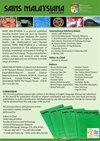Evaluation for Antiviral Potential of Ficus deltoidea Against Dengue Virus Type-2
IF 0.7
4区 综合性期刊
Q3 MULTIDISCIPLINARY SCIENCES
引用次数: 0
Abstract
Dengue is one of the most widespread arthropod-borne viral diseases that cause negative impact globally. Presently, no effective drug is available to safeguard people against dengue. Ficus deltoidea is Malaysia's famous traditional herb belonging to Moraceae family due to its pharmacological potential. F. deltoidea leaves (FDL) were extracted with n-hexane, ethyl acetate and methanol. Cell cytotoxicity study using MTT assay measuring the formazan absorbance was conducted to determine maximum non-toxic concentration on Vero cells. The antiviral activities of various concentrations of FDL extracts were assessed using virus reduction neutralisation tests against dengue virus type 2. The CC20 value of n-hexane, ethyl acetate and methanol FDL extracts were 2.99 ± 0.31, 22.15 ± 2.39, and 25.22 ± 0.42 µg/mL, respectively. Methanol FDL extract at maximum non-toxic concentration exerted strongest direct extracellular virucidal effect against DENV-2. In cell protection assay, ethyl acetate FDL extract achieved highest reduction in viral infectivity (98.17%), whereas n-hexane FDL extract showed strongest inhibition in DENV-2 viral replication in post-infection assay. Methanol FDL extract showed highest selectivity index value in direct virus inhibition, cell protection and post-infection assay. Conclusively, FDL extracts, especially methanol FDL showed potential antiviral activity against DENV-2, thus considered as promising anti-dengue agent.评估榕树对 2 型登革热病毒的抗病毒潜力
登革热是由节肢动物传播的最广泛的病毒性疾病之一,对全球造成负面影响。目前,还没有有效的药物来预防登革热。大戟科榕属植物,是马来西亚著名的传统草药,具有很高的药理潜力。F. deltoidea 叶子(FDL)用正己烷、乙酸乙酯和甲醇提取。细胞毒性研究采用 MTT 法测量甲臢吸光度,以确定对 Vero 细胞的最大无毒浓度。使用病毒还原中和试验评估了不同浓度的 FDL 提取物对 2 型登革热病毒的抗病毒活性。正己烷、乙酸乙酯和甲醇 FDL 提取物的 CC20 值分别为 2.99 ± 0.31、22.15 ± 2.39 和 25.22 ± 0.42 µg/mL。甲醇 FDL 提取物在最大无毒浓度下对 DENV-2 具有最强的细胞外直接杀病毒作用。在细胞保护试验中,乙酸乙酯 FDL 提取物可最大程度地降低病毒的感染率(98.17%),而正己烷 FDL 提取物在感染后试验中对 DENV-2 病毒复制的抑制作用最强。甲醇 FDL 提取物在直接病毒抑制、细胞保护和感染后试验中显示出最高的选择性指数值。最后,FDL 提取物,尤其是甲醇 FDL 对 DENV-2 显示出潜在的抗病毒活性,因此被认为是一种很有前途的抗登革热药物。
本文章由计算机程序翻译,如有差异,请以英文原文为准。
求助全文
约1分钟内获得全文
求助全文
来源期刊

Sains Malaysiana
MULTIDISCIPLINARY SCIENCES-
CiteScore
1.60
自引率
12.50%
发文量
196
审稿时长
3-6 weeks
期刊介绍:
Sains Malaysiana is a refereed journal committed to the advancement of scholarly knowledge and research findings of the several branches of science and technology. It contains articles on Earth Sciences, Health Sciences, Life Sciences, Mathematical Sciences and Physical Sciences. The journal publishes articles, reviews, and research notes whose content and approach are of interest to a wide range of scholars. Sains Malaysiana is published by the UKM Press an its autonomous Editorial Board are drawn from the Faculty of Science and Technology, Universiti Kebangsaan Malaysia. In addition, distinguished scholars from local and foreign universities are appointed to serve as advisory board members and referees.
 求助内容:
求助内容: 应助结果提醒方式:
应助结果提醒方式:


